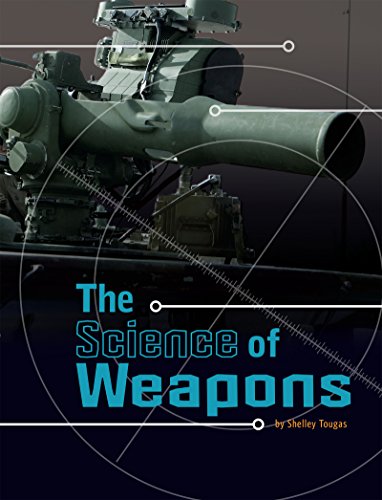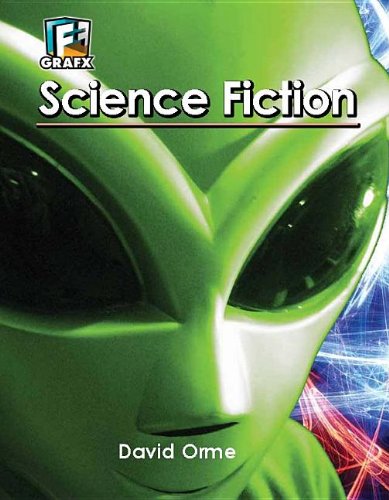-
The Science of Weapons
Shelley Tougas
language (Compass Point Books, Nov. 1, 2014)Humans have used weapons to fight their enemies since the dawn of history. Today's military arsenal is filled with the most accurate and sophisticated tools yet. Read all about these high tech weapons and the science that went into their development.
-
The Science of Science Fiction
Matthew Brenden Wood, Tom Casteel
Paperback (Nomad Press, Feb. 14, 2017)Early science fiction imagined a world with space travel, video calls, and worldwide access to information, things we now know as NASA’s human spaceflight program, Skype, and the Internet. What next? Could we really bring back the dinosaurs, travel to a distant star, or live on Mars?In The Science of Science Fiction, readers ages 12 to 15 explore the science behind classic and modern science fiction stories, including artificial intelligence, androids, and the search for alien life. They learn how cutting edge concepts, including time dilation and genetic manipulation, influence today’s fiction.The Science of Science Fiction promotes critical thinking skills through inquiry, discovery, research, analysis, and reflection of key scientific ideas and concepts made popular by many titles in science fiction. Each chapter features informative sidebars and video and website links for an in-depth look at key topics. Science-minded experiments include a simple demonstration of artificial gravity using a bucket of water and calculating the speed of light using chocolate in a microwave. This variety of resources ensures the material is accessible to students with diverse learning styles. T
T
-
Weapons of Science Fiction
John Hamilton
Library Binding (Abdo Publishing Company, Sept. 1, 2006)Introduces young readers to the world of science fiction. X
X
-
The Science of Science Fiction
Matthew Brenden Wood, Tom Casteel
eBook (Nomad Press, Feb. 20, 2017)Early science fiction imagined a world with space travel, video calls, and worldwide access to information, things we now know as NASA's human spaceflight program, Skype, and the Internet. What next? Could we really bring back the dinosaurs, travel to a distant star, or live on Mars?In The Science of Science Fiction, readers ages 12 to 15 explore the science behind classic and modern science fiction stories, including artificial intelligence, androids, and the search for alien life. They learn how cutting edge concepts, including time dilation and genetic manipulation, influence today's fiction.The Science of Science Fiction promotes critical thinking skills through inquiry, discovery, research, analysis, and reflection of key scientific ideas and concepts made popular by many titles in science fiction. Each chapter features informative sidebars and video and website links for an in-depth look at key topics. Science-minded experiments include a simple demonstration of artificial gravity using a bucket of water and calculating the speed of light using chocolate in a microwave. This variety of resources ensures the material is accessible to students with diverse learning styles.
-
Science Fiction
Jesse G. Cunningham
Hardcover (Greenhaven Press, Oct. 31, 2001)Book by Cunningham, Jesse G.
-
The Science of Science Fiction
Matthew Brenden Wood, Tom Casteel
Hardcover (Nomad Press, Feb. 14, 2017)Early science fiction imagined a world with space travel, video calls, and worldwide access to information, things we now know as NASA’s human spaceflight program, Skype, and the Internet. What next? Could we really bring back the dinosaurs, travel to a distant star, or live on Mars?In The Science of Science Fiction, readers ages 12 to 15 explore the science behind classic and modern science fiction stories, including artificial intelligence, androids, and the search for alien life. They learn how cutting edge concepts, including time dilation and genetic manipulation, influence today’s fiction.The Science of Science Fiction promotes critical thinking skills through inquiry, discovery, research, analysis, and reflection of key scientific ideas and concepts made popular by many titles in science fiction. Each chapter features informative sidebars and video and website links for an in-depth look at key topics. Science-minded experiments include a simple demonstration of artificial gravity using a bucket of water and calculating the speed of light using chocolate in a microwave. This variety of resources ensures the material is accessible to students with diverse learning styles. T
T
-
The Science of Science Fiction
Matthew Brenden Wood, Tom Casteel
eBook (Nomad Press, Feb. 15, 2017)Early science fiction imagined a world with space travel, video calls, and worldwide access to information, things we now know as NASA’s human spaceflight program, Skype, and the Internet. What next? Could we really bring back the dinosaurs, travel to a distant star, or live on Mars?In The Science of Science Fiction, readers ages 12 to 15 explore the science behind classic and modern science fiction stories, including artificial intelligence, androids, and the search for alien life. They learn how cutting edge concepts, including time dilation and genetic manipulation, influence today’s fiction.The Science of Science Fiction promotes critical thinking skills through inquiry, discovery, research, analysis, and reflection of key scientific ideas and concepts made popular by many titles in science fiction. Each chapter features informative sidebars and video and website links for an in-depth look at key topics. Science-minded experiments include a simple demonstration of artificial gravity using a bucket of water and calculating the speed of light using chocolate in a microwave. This variety of resources ensures the material is accessible to students with diverse learning styles.
-
Science Fiction
Lowenherz Robert J
Paperback (Amsco School Publications, Inc, April 1, 2002)Purpose: To enhance students' enjoyment of reading. This book can rekindle anyone's love of reading. A sterling collection of the best science-fiction stories by the best writers. Complete, unabridged works. Fascinating articles of science fact. Challenging activities that focus on high-level reading skills, writing, and vocabulary. Authors include Isaac Asimov, Carl Sagan, Ray Bradbury, Robert Silverberg, Arthur C. Clarke, Ursula K. Le Guin. The book is organized around six themes: Space Travel, Time Travel, Robots and Artificial Intelligence, Space Aliens or Extraterrestrials, Future People, and Future Worlds. All this, packed in a book that has the look of the 21st century! Paperback
-
Science Fiction
Jane West
eBook (Rising Stars UK Ltd., June 4, 2013)Find out about the world of science fiction - discover lots about time travel and UFOs! Welcome to the world of science fiction. Zoom in on space travel, robots and Al, virtual worlds and war in space! Focus on Alien invasions! The Snapshots series of colourful and visually appealing titles is designed to engage 9 to 14 year old reluctant readers. With their bold design and familiar subject matter – from battles to Batman – these books are perfect for guided reading and for encouraging less able readers to enjoy reading alone.
-
The Science of Weapons
Shelley Marie Tougas, Kathleen Baxter, Raymond L. Puffer PhD
Library Binding (Compass Point Books, Jan. 1, 2012)Humans have used weapons to fight their enemies since the dawn of history. Today’s military arsenal is filled with the most accurate and sophisticated tools yet. Read all about these high tech weapons and the science that went into their development. X
X
-
The Science of Weapons
Shelley Marie Tougas, Kathleen Baxter, Raymond L. Puffer PhD
Paperback (Compass Point Books, Feb. 1, 2012)Humans have used weapons to fight their enemies since the dawn of history. Todays military arsenal is filled with the most accurate and sophisticated tools yet. Read all about these high tech weapons and the science that went into their development. X
X
-
Science Fiction
David Orme
Hardcover (Perfection Learning, March 31, 2012)Explore aliens, time travel, and more before reading "The City" and seeing how the future might not be a great place to live. N
N